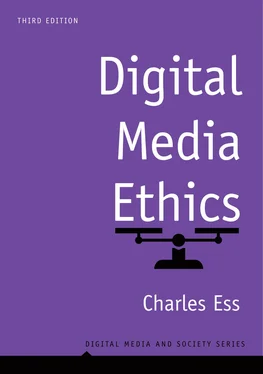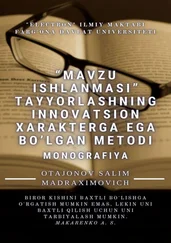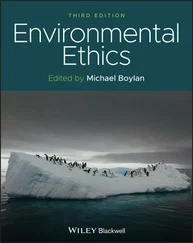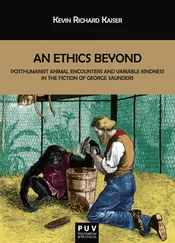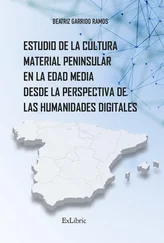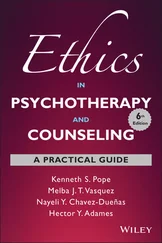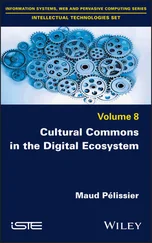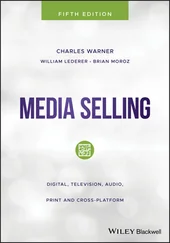How to do ethics in the new mediascape: Dialogical approaches, difference, and pluralism
These examples of the AoIR guidelines and recent EU law and ethics further offer important suggestions for how to proceed – specifically, as both examples share two elements in common. To begin with, they each incorporate what we can think of as dialogical approaches – approaches that emphasize the importance of listening for and respecting differences between our diverse ethical views.
Ordinarily – especially if our thinking is shaped by a polarized either/or common in popular media reporting – we tend to understand the difference between two views in only one possible way: if the two views are different, one must be right and the other wrong. Again, as we will explore more carefully in chapter 6, such approaches are called ethical absolutism or ethical monism . These may work well in certain contexts and with regard to some ethical matters. But, especially in a global context, a severe consequence of such ethical monism is to force us into thinking that one – and only one – particular ethical framework and set of norms and values (usually, those of the culture[s] in which we grew up) are right, and those that are different can only be wrong.
In the face of such monism and its intolerance of different views, we are often tempted to take a second position – one called ethical relativism . Ethical relativism argues that beliefs, norms, practices, frameworks, etc., are legitimate solely in relation to a specific culture, time, and place. In this way, ethical relativism allows us to avoid the intolerance of ethical monism and to accept all views as legitimate. Such an approach is especially attractive as it prevents us from having to judge among diverse views and cultures: we can endorse all of them as legitimate in at least a relative way (i.e., relative to a specific culture, etc.).
But the examples of ethical pluralism in both internet research ethics and EU law and ethics surrounding privacy and data privacy protection show how such pluralism stands as a third possibility – one that is something of a middle ground between absolutism and relativism. That is, to begin with, such pluralism avoids the either/or of ethical monism – an either/or that forces us to choose between two different views, endorsing one as right and the other as wrong. Rather, pluralism shows how different views may emerge as diverse interpretations or applications of shared norms, beliefs, practices, etc. To be sure, not all of our differences can be resolved so neatly; but, when pluralism succeeds, the differences between two (or more) views thus do not force us to accept only one view as right and all the others as wrong. Rather, we can thereby see that many (but not necessarily all) different views may be right, insofar as they function as diverse interpretations and applications of shared norms and values.
In addition, ethical pluralism thereby overcomes a second either/or – namely, the apparent polarity between ethical monism and ethical relativism themselves. That is, when we first encounter these two positions – and, once more, especially if our thinking has been shaped by prevailing dualities in the thinking of those around us, including popular media reports – our initial response may again be either/or: either monism is right or relativism is right, but not both. In important ways, ethical pluralism says that both are right – and both are wrong. From a pluralist perspective, monism is correct in its presumption that universally valid norms exist, but mistaken in its insistence that the differences we observe between diverse cultures in terms of their practices and behaviors must mean that only one is right and the rest are wrong. Similarly, from a pluralist perspective, ethical relativism is correct in its attempt to endorse a wide range of different cultural norms and practices as legitimate, but mistaken, first of all, in its denial of universally valid norms.
We will explore these theories of absolutism, relativism, and pluralism in more detail in chapter 6. Here it suffices simply to introduce these possibilities of thinking in an initial way to help us move beyond the either/or thinking that tends to prevail in popular media – and thereby, perhaps, our own thinking.
Given this first introduction, perhaps we can now see more clearly why the either/or underlying many popular media reports – especially of the moral panic variety – works against our best thinking. Ethical pluralism requires us to think in a “both/and” sort of way, as it conjoins both shared norms and their diverse interpretations and applications in different cultures, times, and places. But if the only way we are able to think about ethical matters is in terms of the either/or of ethical monism, then we literally cannot conceive of how to move beyond the right/wrong dualisms with which it often confronts us. That is, we will find it difficult conceptually to move toward pluralism and other forms of middle grounds, because our either/or thinking insists that we can only have either unity (shared norms) or difference (in interpretation/application), but not both.
Stated differently: in dialogical processes, we emphasize learning to listen for and accept differences – rather than rejecting them from the outset because different views must thereby be wrong (ethical monism). But we also do not come to endorse all possible views as correct (ethical relativism), because not every view can be understood as a legitimate interpretation or application of a shared norm. Rather, dialogical processes help us sort through, on the one hand, which views may stand as diverse interpretations of shared norms in a pluralism and, on the other, those views (e.g., endorsing genocide, racism, violence against women as inferior, etc.) that cannot be justified as interpretations of shared norms.
Further considerations: Ethical judgments
Another difficulty with the “moral panics” approach to ethical issues in the new mediascape is that it suggests that “ethics” works like this:
1 There are clear, universally valid norms of right and wrong that we can take as our ethical starting points – as premises in an ethical argument.1
2 All that “ethics” really involves is applying these initial premises to the particulars of the current case in front of us – in a straightforward deduction that concludes the right thing to do, as based on our first premises.
3 Once we have our ethical answers in this way, we can be confident that our answers are right; those who disagree with us must be wrong.
This approach to ethics is not necessarily mistaken; on the contrary, it seems that much of the time, most of us in fact do not perceive an ethical problem or difficulty in the situation we’re facing – because our ethical frameworks already provide us with reasonably clear and straightforward answers along just these lines. Most of us, for example, do not routinely lie, steal, or kill – despite sometimes what may be considerable temptations to do so – because we accept the general norms and principles that forbid such acts.
At the same time, however, this initial understanding of ethics obscures a number of important dimensions of ethical reflection.
To begin with, this initial approach runs counter to what seems actually to happen when we encounter genuine ethical problems and puzzles. Take, for example, the problem of downloading music illegally from the internet. We all know that this is illegal, but we are also influenced in our thinking by other considerations, e.g.:
I’m not likely to get caught, so there’s virtually no possibility that this will actually hurt me in some way.
Читать дальше
